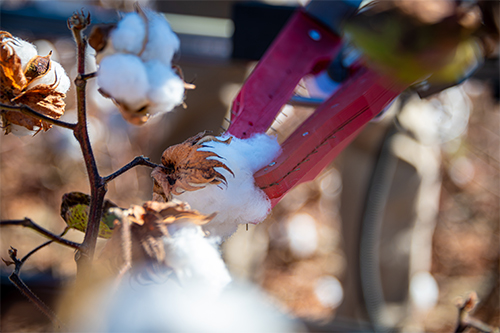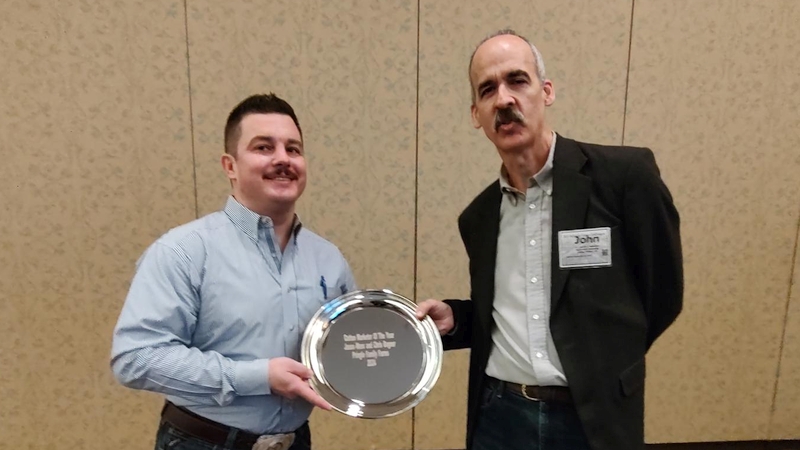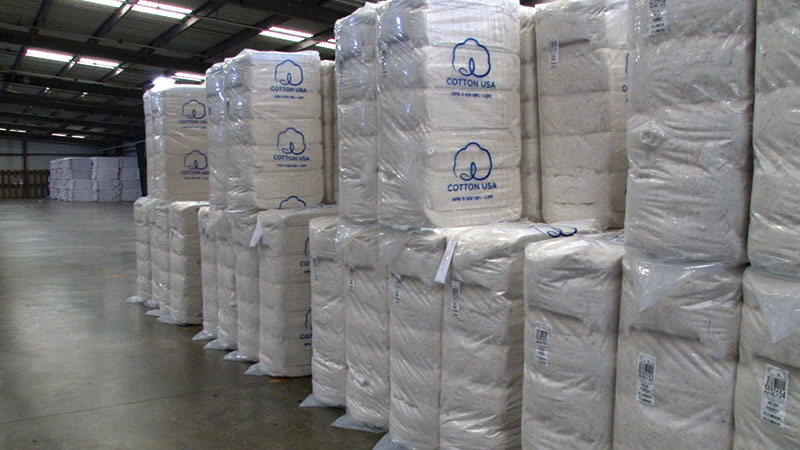Born in Cotton
Some people join the cotton business. Some people are born in the cotton business.
John Dunavant was born in it. “I’ve been in the cotton business since day one,” he says.
Serving as Executive Vice President of Domestic Sales and Southeast Buying, he is part of the third generation to serve on the management team of Dunavant Enterprises — the largest privately owned cotton merchandiser in the world, based in Memphis, TN.
In 1956, his grandfather William B. Dunavant, Sr., became a full partner in the Memphis cotton firm T. J. White & Co. After White retired in 1960, the name of the company was changed to W. B. Dunavant & Company. Dunavant, Sr., died not long afterwards and William B. Dunavant, Jr. took over. Eventually the name was changed again, this time to Dunavant Enterprises. John’s older brother William B. Dunavant, III, now serves as the company’s CEO.
Although he didn’t know a soul at Clemson University and the school is nine hours from Memphis, Dunavant decided that was the university to attend for a degree in agricultural economics. “Since I had complete confidence I’d be in cotton, I chose Clemson,” he explained. “I knew Clemson had a great agricultural economics program and that is why I chose this program.”
With degree in hand, he “officially” joined Dunavant Enterprises in 1986 and went through a four-year training program, traveling to Dunavant offices throughout the U.S. and overseas. In the U.S., that included Greenville, SC; Gastonia, NC; Lubbock, TX; Fresno, CA; Phoenix, AZ, and New York. The overseas travel took him to Malaysia, Singapore, Thailand, the Philippines and Korea.
Dunavant became involved with the Atlantic Cotton Association in 1991 and was elected president in 2005. The Atlantic Cotton Association, along with three other regional associations — Southern, Texas and Western — are under the umbrella of the American Cotton Shippers Association (ACSA). ACSA members are engaged in purchasing, storing, transporting and merchandising of cotton.
Dunavant currently serves as ACSA First Vice President and will be incoming President for the 85th ACSA Annual Convention in Chicago May 27-29.
As cotton acreage and production dropped, so has everything else associated with cotton, almost without exception. “Membership (in ACSA) five years ago was roughly 250 people,” Dunavant says. “This year we’re down to approximately 160. That’s a drastic cut.
“And production has dropped from 24 million bales in 2005 to 13 million in 2009, so dues and fees have dropped considerably, too. We’ve had to tighten our belts throughout all cotton businesses, firms and shippers. That means so have associations. We have to rethink and rebuild the model, and that’s where our focus is right now.”
The Logic of Logistics
The explosion and crash in the cotton market a little over a year ago couldn’t have been missed by anyone in the cotton industry.
Nor could the similar circumstances with crude oil. What was a good logistics plan one day was unworkable the next.
“Obviously it was very difficult with crude going over $145 (per barrel) last year,” Dunavant says. “It had a ripple effect. Freight went straight up and we had sales on the books. We had calculations of what our landing costs were and then all of a sudden crude goes through the roof. Your landing costs go through the roof, too, but you could not pass that along.
“We went through a tremendous challenge with the freight carriers increasing their charges to shippers.”
Then a cliché was confirmed: “What goes around comes around.” The surprise was how quick the coin flipped. In less than a year, crude oil rose to $145 per barrel then dropped by $90 per barrel.
“The shipping lines understand that they have to be more competitive on their rates,” says Dunavant.
“There’s just not as much being shipped to China or from China. There is not a container shortage like there was last year. With empty containers and the freight going down, the freight lines have less leverage and they clearly know that.”
“Cheaper freight rates help make U.S. cotton more competitive on the global market.”
A Dollar and a Yuan
Dunavant says China has pegged its currency to the U.S. dollar and that makes it a major factor in trade between the two countries.
“When the dollar is weak, we’re not going to bring as much in; when it’s strong, we’re going to bring in more,” Dunavant explains.
But even though the two currencies are theoretically in tandem, he says Chinese products are extremely competitive for the U.S. consumer. “In a lot of cases, boats were taking empty containers back to China so they would move quicker,” Dunavant says. “I know that is hard to believe, but China wanted the containers to reload and send products back over here quicker.”
With those considerations in mind, is there a point where the value of the dollar and the competitiveness of Chinese products can find equilibrium? “It’s so hard to find a balance with the volatility in the markets,” Dunavant says. “If you want to sell cotton, it cannot truly reflect the value of the dollar because there are so many variables.”
“For example,” he continues, “India and China — the two largest cotton-producing countries — are sitting on huge supplies of cotton, but yet the U.S. had the second largest export sales for the month of February in history. Obviously we are extremely competitive.”
There are numerous reasons why, Dunavant says. But some of the main ones were due to competitive prices for de-certificated stock and level 1 bark out West Texas.
Like the U.S., China could have a considerable drop in cotton acreage this season due to the fact that China is looking to continue to increase food acreage versus fiber. “We’ve heard that there could be some big percentage drops and we are researching to confirm that they are heading in that direction,” Dunavant says. “Common sense tells you they have to plant more food crops, but the average farmer in China grows 2 to 4 acres of cotton … maybe up to 5 acres, and they’re producing over 30 million bales (per year).
“They plant everything — it’s like a garden. They are so accustomed to growing various crops that there is going to have to be a huge premium to encourage them not to plant cotton.”
Contract Sanctity
Generally the U.S. is considered a supplier of high quality of cotton and the most reliable shipper in the world.
“We have the least contamination and the fiber characteristics are on the upper end,” Dunavant says. “But since we are machine-picked versus hand-picked, there is a difference in short fiber content. That’s the one liability as far as quality, but the mills love the reliability of U.S. cotton being shipped to them.”
During the market gyrations of 2008, some mills found themselves in the precarious situation of having bought cotton at a high price, then having to sell textiles into a depressed market. The result was some mills defaulting on contracts with merchants.
“Sanctity of contract means a lot,” says Dunavant. “There have been tremendous challenges from last year to this year with high-price contracts. There have been numerous mills put on the ICA default list and that has sent up a red flag to our customers that if they don’t fulfill the terms of the contracts, they go on the default list. Shippers who are members of ICA will not sell to them.”
The International Cotton Association (ICA) is an arbitrary association that attempts to settle disputes in the international cotton trade.
Add 2 photos to captions:
John Dunavant
Andy Weil was President of the American Cotton Shippers Assn. in 2007








